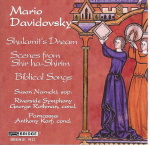Bridge’s second installment of Mario Davidovsky’s seldom-recorded music neatly sums up the composer’s manifold influences in vocal selections based on the ancient Hebrew poetry “Song of Songs”. At various points we hear threads of the composer’s lifelong interest in the romanticism of Berg, the polyphonic style of Renaissance music, and the re-creation of his groundbreaking work in the electronic medium through “analog” instruments. Soprano Susan Narucki headlines all three works and easily proves herself the heiress of Jan de Gaetani and Cathy Berberian in her ability to negotiate the perilous leaps, abrupt dynamic contrasts, and myriad nuanced colorations required in this difficult but lyrical music.
Shulamit’s Dream (1993) is the largest scale work of the program’s three, requiring a full orchestra but rarely utilizing it all at once. The opening measures are reminiscent of Berg, featuring more sumptuous, shimmering orchestral writing and harmonic complexity than the other works, which display leaner, pointillistic textures. If anything, the vocal writing calls to mind Lulu’s Lied. The sudden changes in texture and dynamics that proliferate both in this and the other pieces show how Davidovsky (aided by the virtuosic proficiency of today’s performers) was able to embody his trademark electronically-induced soundscape (mainly found in his series of Synchronisms) in the orchestral timbre.
The centerpiece of this disc, the 27-minute quasi-cantata Shir ha-Shirim (1975), juxtaposes the mysterious vocal sonority typical of Renaissance polyphony (via two tenors singing in falsetto, like countertenors) with spiky and resonant intonations from strings and piano, ostensibly evoking the eerie electronic effects of Davidovsky’s past works. Evidently to conjure up an arid and harsh desert landscape, the piano accompanies the singers with subito attacks, while the string contributions are reduced to pizzicato and col legno tricks. With the winds mostly adding to the exotic Middle Eastern twang, the small instrumental complement cleverly modulates, amplifies, and shades the vocal lines. The final mini-song cycle, Biblical Songs (1990), retains the subject matter of the other pieces but is a touch more intimate. Instrumental economy belies the power behind the music and words (as in the climactic section that calls for God’s vengeance against the Babylonian invaders, where the language switches suddenly from English to Hebrew).
The twin ensembles, Parnassus and Riverside Symphony, fixtures of the New York musical scene, perform these works with assurance. The sound is excellent, and once again, Narucki is exemplary throughout. The only downside here is that despite its timeless texts and the strong meaning they held for the composer as a youth, the music does not convey much palpable emotional content such that it could be described as “moving”. In the end, the whole effort, as well-performed and (at times) beautiful as it is, resounds mainly as a tribute to Davidovsky’s prodigious compositional techniques and fills a gap in this important and underplayed composer’s repertoire.
































